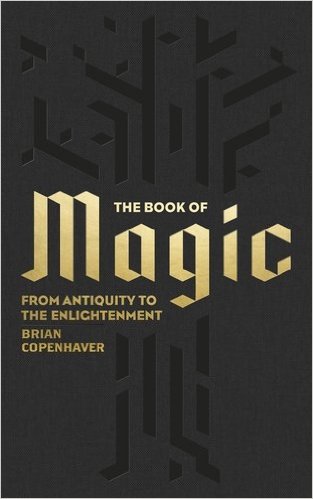Published by Penguin last month in the U.S. The Book of Magic: From Antiquity to the Enlightenment, edited by Brian Copenhaver looks at the birth of modern science and its close relationship and interaction with magical practice. Both in fact were based on experimentation, making and analyzing documentation of the procedures undertaken and their results i.e.g grimoires. And this interrelationship was revived by Aleister Crowley whose magical Order, the A.’.A.’.’s boasted the motto: The Method of Science, the aim of Religion.”
The Book of Magic was reviewed by Prospect Magazine last year when it was published in the UK: “The role of the magic tradition in the inception of science is complex but to present the two as antithetical is wrong. They were in many respects mutually supportive and even hard to distinguish. Magic as an intellectual endeavour can be seen as largely sober and systematic. Even the tricksier ‘popular’ magic of the showman or mountebank was closely allied to practical technologies and mechanical skill. And if it had a tendency to patch together ad hoc explanations for puzzling phenomena, magic wasn’t doing much more than modern science continues to do; what has changed is the rigour with which such ‘explanations’ are now scrutinised.”
Read the entire review here:
And you can purchase the book here:
http://www.amazon.com/The-Book-Magic-Antiquity-Enlightenment/dp/0241198569
Amazon’s description says:
“The Bible is full of stories featuring forms of magic and possession—from Moses battling with Pharaoh’s wizards to the supernatural actions of Jesus and his disciples. As, over the following centuries, the Christian church attempted to stamp out “deviant” practices, a persistent interest in magic drew strength from this Biblical validation. A strange blend of mumbo-jumbo, fear, fraud, and deeply serious study, magic was at the heart of the European Renaissance, fascinating many of its greatest figures.
“This is a book filled with incantations, charms, curses, summonings, cures, and descriptions of extraordinary, shadowy, only half-understood happenings from long ago. It features writers as various as Thomas Aquinas, John Milton, John Dee, Ptolemy, and Paracelsus along with anonymous ancient and medieval works that were, in some cases, viewed as simply too dangerous even to open.
“The Book of Magic will be welcomed by everyone from those with the most casual interest in the magical tradition to anyone drawn to the Renaissance and the tangled, arcane roots of the scientific tradition.”
Thanks to Soror Hypatia for the tip!

